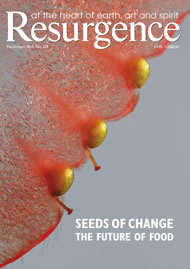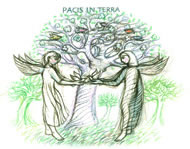Big problems are consequences of small actions. Global warming and food insecurity are big problems but they are a result of the small activities we perform every day.
Conversely, the big solutions are also rooted in small actions; if we shop, move, eat, drink, work and live our everyday life with disregard to the integrity of the Earth community, we are bound to destabilise the finely balanced harmony of our home planet. On the other hand, if we perform everyday actions carefully and mindfully, we contribute to the wellbeing of our entire ecosystem.
Faced with the huge challenges of our time, it is easy to feel frustrated, depressed and powerless: “What can I do to address monumental crises such as climate change, consumerism, hunger and social injustice?”
“The answer is as simple as it is disconcerting,” said
E. F. Schumacher. “We can each of us work to put our own house in order.”
Putting our house in order starts with our dining table, our kitchen, our garden and our shopping. In other words, our food.
The first step towards preserving the integrity, stability and beauty of the biotic community is to eat only good, fresh, local, organic and delicious food every day, every week, every month and every year. In order to achieve this, we have to start paying attention to the whole process of growing, distributing and eating food. However busy we may be, if we have no time for gardening, cooking and eating together with our family, friends and guests, then we have no time to live, no time to preserve the beauty of the planet.
We eat every day but we hardly know how our food is grown and where it is coming from. For those who live in the fast lane, who buy ready meals from a supermarket, at a railway station on a return journey home, or on a commuter train, food is merely fuel for the body and nothing more. But for those who are ecologically minded and spiritually conscious, food is sacred and sustains the soul as well as our society.
According to the authors of the Upanishads, life is because food is and therefore we are taught not to denigrate food or show indifference to it. Food is the primary condition of all life; body, mind, spirit and soul. Food comes even before god. “You cannot worship god on an empty stomach,” said the poet Kabir.
To demonstrate that the powers of the mind, and not just physical strength, are dependent on food, the philosopher Uddalaka asked his son Shvetaketu, who was a great scholar of the Vedas and proud of his mental capacities, to go without food for fifteen days. At the end of that period, Shvetaketu was asked to recite the Vedas but he could not. His mental powers and memory had become weak and feeble. He was then offered food, after which his mental strength slowly returned sufficiently for him to recite the Vedas once more.
This story illustrates that food is of the utmost importance for physical as well as spiritual nourishment and so, before we attend to business, politics, science, technology and everything else, we must get our food systems right, and we can start by choosing food which is wholesome, natural and grown without damaging the Earth.
With a rising population and the growing threat of climate change, vegetarian food has become an ecological imperative. We should also be deriving increasing amounts of our food from the trees; much of our oils, fruits, nuts, and medicines can and should come from perennial crops like trees. Thus we can reduce our impact on the land and at the same time increase carbon sequestration in the soil as well as in the trees. Trees are our latter-day angels. Food security, water security and climate security are guaranteed by trees. Trees are our only true food insurance policy.
The special feature on food in this issue of Resurgence explores the way we farm our land, rear our animals, cook our food and share it with our fellow human beings. Sometimes we get it right, but mostly we are getting it wrong and, as a result, we are contributing to the destruction of the integrity, stability and beauty of the biotic community.







